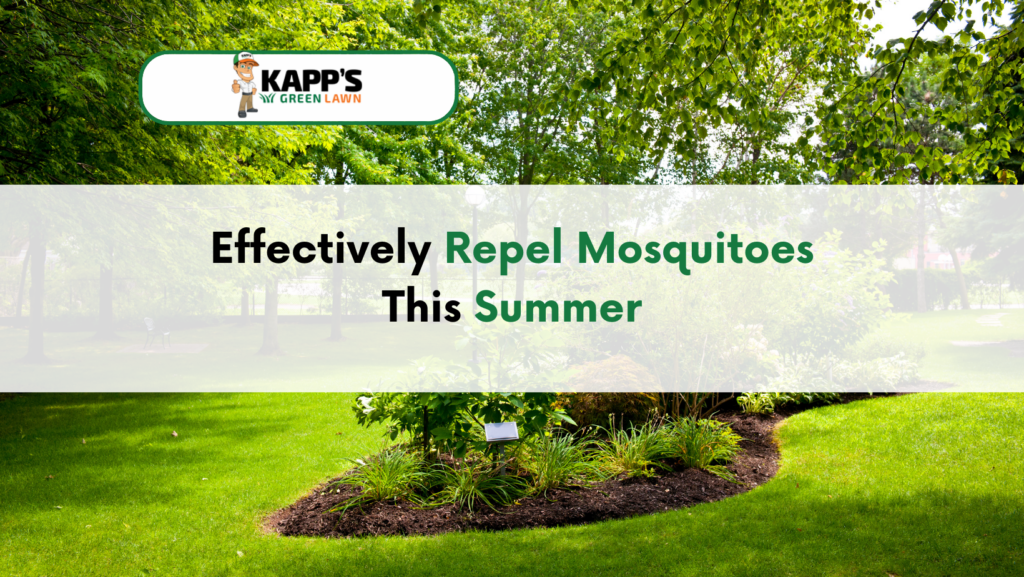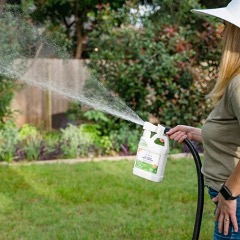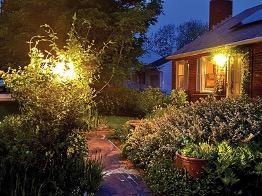
Effectively Repel Mosquitoes This Summer
Summer is a time for enjoying the great outdoors, but nothing can ruin a beautiful evening faster than pesky mosquitoes. These tiny insects can be more than just a nuisance; they can carry harmful diseases like West Nile virus and Zika virus. Understanding how to effectively repel mosquitoes is essential for maintaining a comfortable and safer outdoor space.
Mosquitoes are attracted to warm, humid environments and breeding grounds found in standing water. They are often most active during dawn and dusk. Knowing their habits and preferences can help you take proactive steps to minimize their presence around your home.
At Kapp's Green Lawn Care, we understand the importance of enjoying a mosquito-free summer. Our lawn services and pest control solutions are designed to keep your outdoor areas safer and comfortable. With our expertise and a few practical tips, you can significantly reduce the mosquito population and enjoy the season without any disturbances.
In this comprehensive guide, we'll explore various methods to repel mosquitoes, including natural remedies, chemical treatments, and preventive measures. Whether you prefer eco-friendly solutions or more conventional approaches, we have the information you need to keep mosquitoes at bay. Get ready to learn how to create a mosquito-free environment and make the most of your summer with effective strategies from Kapp's Green Lawn Care.
Understanding Mosquito Barrier Sprays
Mosquito barrier sprays are a popular method for keeping mosquitoes away from your yard. These sprays create a protective barrier that repels mosquitoes, making your outdoor space more enjoyable. They are typically applied to grass, shrubs, and other foliage where mosquitoes tend to hide and breed.
How Mosquito Barrier Sprays Work
Mosquito barrier sprays work by creating a coating on plants and grass that repels mosquitoes. When sprayed on leaves, trees, and other vegetation, the chemicals create a barrier that mosquitoes find unattractive. This deters them from entering and lingering in your yard. The sprays work by targeting the nervous system of mosquitoes, causing them to become disoriented and stay away from treated areas.
Benefits of Using Mosquito Barrier Sprays
Mosquito barrier sprays offer several benefits for maintaining a mosquito-free yard:
Long-Lasting Protection: One of the main benefits is that these sprays provide long-lasting protection. A single application can keep mosquitoes at bay for weeks. This means you can enjoy your outdoor space without the constant worry of being bitten.
Ease of Use: Mosquito barrier sprays are easy to apply. You can either do it yourself or hire a professional service. For DIY methods, products are available at garden stores, and application instructions are straightforward.
Environmentally Friendly Options: Many barrier sprays are made with ingredients that are safer for the environment, pets, and humans. Choosing a product with natural ingredients reduces the impact on beneficial insects like bees and butterflies.
Immediate Results: These sprays offer almost immediate results. Within minutes of application, you should notice a significant decrease in mosquito activity, making your yard more comfortable to spend time in.
Applying Mosquito Barrier Sprays
Applying mosquito barrier sprays is a straightforward process, but it requires some preparation and knowledge to be effective.
Prepare Your Yard: Before applying the spray, clear your yard of any standing water. Mosquitoes breed in stagnant water, so empty bird baths, flower pots, and other containers. Trim grass and shrubs to allow the spray to reach all areas where mosquitoes might hide.
Choose the Right Time: The best time to apply the spray is during the early morning or late afternoon when mosquitoes are most active. Avoid spraying on windy days, as this can cause the spray to drift away from the targeted areas.
Application Technique: Use a sprayer to apply the barrier spray evenly across your yard. Focus on areas where mosquitoes are likely to breed and hide, such as tall grass, shaded areas, and bushes. Make sure to cover the underside of leaves where mosquitoes tend to rest.
Regular Treatments: For best results, reapply the spray every three to four weeks or as recommended on the product label. Regular treatments ensure continuous protection throughout the mosquito season.

Natural Mosquito Repellents
If you prefer a more natural approach, there are several options available to repel mosquitoes:
Essential Oils: Oils like citronella, eucalyptus, and lavender are known for their mosquito-repelling properties. You can mix these oils with water and spray them around your yard. They are safer for pets and humans and have a pleasant smell.
Herbs and Plants: Planting certain herbs and plants around your yard can naturally repel mosquitoes. Lemongrass, rosemary, and marigolds are effective at keeping mosquitoes away. You can place these plants in pots or garden beds around your outdoor space.
Garlic Spray: Garlic has natural repellent properties. Mixing minced garlic with water and spraying it around your yard can deter mosquitoes. While the smell may be strong initially, it fades quickly to human noses but remains repellent to mosquitoes.
Preventive Measures to Keep Mosquitoes Away
In addition to using sprays and natural repellents, there are several preventive measures you can take to reduce mosquito populations in your yard:
Eliminate Standing Water: Mosquitoes lay eggs in standing water. Regularly inspect your yard for any sources of stagnant water and remove them. This includes gutters, tarps, and bird baths.
Maintain Your Lawn: Keep your grass trimmed and bushes pruned to reduce mosquito hideouts. Removing excess vegetation reduces the areas where mosquitoes can rest during the day.
Install Screens: Installing screens on windows and doors can prevent mosquitoes from entering your home. Make sure there are no gaps or tears in the screens.
Use Fans: Mosquitoes are weak fliers. Setting up fans around your outdoor seating areas can create a breeze that makes it difficult for mosquitoes to land, reducing their presence.
Wear Protective Clothing: When spending time outdoors, wear long sleeves and pants to minimize exposed skin. Light-colored clothing can also be helpful, as mosquitoes are less attracted to light hues.
Chemical Treatments for Mosquito Control
While natural remedies and preventive measures can be effective, sometimes, a more robust approach is necessary. Chemical treatments can offer powerful mosquito control for your yard:
Insecticides: These chemicals kill mosquitoes on contact. They can be applied as sprays, granules, or foggers. When using insecticides, follow the product instructions carefully to ensure safer and effective application.
Larvicides: These treatments target mosquito larvae before they become adults. Larvicides can be applied to standing water where mosquitoes breed. They prevent larvae from developing into biting adults, reducing the overall population.
Professional Services: Hiring a pest control service can provide a comprehensive and sustained approach to mosquito control. Professionals can assess your yard, apply treatments effectively, and provide ongoing maintenance to keep mosquitoes at bay.
Creating a Mosquito-Free Entertaining Area
Enjoying your outdoor space without mosquitoes is essential for summer gatherings and relaxation:
Set Up Mosquito Traps: Mosquito traps can capture and kill mosquitoes. Place them around your entertaining areas to reduce the mosquito population. There are various types of traps available, including electric traps, sticky traps, and CO2 traps.
Use Citronella Candles: Citronella candles release a scent that repels mosquitoes. Place these candles around your seating area to create a protective barrier. They provide a pleasant ambiance while keeping mosquitoes away.
Install Bug Zappers: Bug zappers attract and kill flying insects, including mosquitoes. Installing zappers around your patio or deck can help control the mosquito population.
Create a Breeze: As mentioned earlier, mosquitoes struggle to fly in windy conditions. Set up fans in your outdoor seating areas to create a breeze and make it difficult for mosquitoes to land on you.
Screened-In Areas: If possible, create a screened-in porch or patio area. Screens provide a physical barrier that keeps mosquitoes out while allowing you to enjoy the fresh air.
Outdoor Lighting: Mosquitoes are attracted to certain types of light. Use yellow or LED lighting around your outdoor space, as these are less attractive to mosquitoes compared to traditional incandescent bulbs.

By understanding and implementing these strategies, you can effectively repel mosquitoes and create a more enjoyable outdoor environment. Whether you prefer natural solutions, preventive measures, or chemical treatments, there are numerous ways to keep mosquitoes at bay. With consistent effort and the right approach, you can enjoy a mosquito-free summer and make the most of your outdoor space.
Choosing Effective Mosquito Barrier Sprays
When selecting a mosquito barrier spray, it’s important to choose one that is both effective and safer for your family, pets, and the environment. Here are some tips to help you make the best choice:
Read Labels Carefully: Always check the label for active ingredients. DEET, picaridin, and permethrin are common mosquito repellents that are effective. For a more natural option, look for sprays containing oils like lemon eucalyptus or citronella.
Environmentally Safer Options: Consider choosing products labeled as environmentally safer or biodegradable. These products reduce the risk of harming beneficial insects and plants while still providing effective mosquito control.
Longevity of Protection: Different sprays offer varying lengths of protection, ranging from a few hours to several weeks. Determine how often you are willing to apply sprays and choose a product that fits your needs.
Ease of Application: Look for sprays that are easy to apply. Some come in ready-to-use bottles, while others might need dilution or specific application equipment. Ensure you know how to use the product before purchasing.
Common Misconceptions About Mosquito Control
There are many myths and misconceptions about mosquito control that can lead to ineffective solutions. Let’s clear up some common misunderstandings:
Bug Zappers: While bug zappers can kill many flying insects, they are not particularly effective against mosquitoes. These devices attract and kill numerous beneficial insects while having minimal impact on mosquito populations.
Ultrasonic Devices: Some products claim to repel mosquitoes using sound waves. However, studies show that ultrasonic devices have no significant effect on reducing mosquito bites.
Vitamin B Supplements: There is a myth that taking vitamin B supplements can repel mosquitoes. Scientific research does not support this claim, and relying on this method can lead to more bites.
Bananas Attract Mosquitoes: Eating bananas is often said to attract mosquitoes due to the scent on your skin. There’s no strong evidence to support this, so your diet likely has little impact on mosquito attraction.
Integrated Pest Management for Mosquito Control
Integrated Pest Management (IPM) is a comprehensive approach that combines multiple strategies to manage pests effectively. Here’s how you can incorporate IPM for mosquito control:
Cultural Controls: These involve making habitat changes to reduce mosquito breeding. Remove standing water, maintain your lawn, and use screens on windows and doors. Regularly clean gutters and ensure water drains properly on your property.
Biological Controls: Natural predators like dragonflies and certain fish can help control mosquito populations. Introducing these predators to your yard can reduce the number of mosquitoes.
Mechanical Controls: Use physical barriers like window screens, mosquito nets, and fans to keep mosquitoes away. Setting up these barriers can significantly reduce contact with mosquitoes.
Chemical Controls: When necessary, use mosquito barrier sprays and larvicides. Follow the label instructions carefully to ensure safer and effective use. Combining chemical controls with other IPM strategies can offer more sustainable results.
Attracting Natural Mosquito Predators
Encouraging natural predators in your yard can be an effective way to keep mosquito populations in check. Here are some common predators and how to attract them:
Birds: Birds such as swallows and purple martins eat large quantities of mosquitoes. Install birdhouses and maintain a bird-friendly yard with food and water sources to attract these natural predators.
Bats: Bats are highly effective mosquito hunters. Setting up bat houses can encourage bats to roost in your yard, helping control mosquito numbers.
Dragonflies: Dragonflies and their larvae, also known as nymphs, are voracious mosquito predators. Planting vegetation around ponds or water features can attract dragonflies to your yard.
Fish: Fish like goldfish and guppies eat mosquito larvae. Stocking ponds and water features with these fish can reduce the number of mosquitoes breeding on your property.
Creating a Mosquito-Resistant Landscape
Designing your landscape to be less attractive to mosquitoes can significantly reduce their presence. Here are some tips for creating a mosquito-resistant yard:
Choose the Right Plants: Some plants naturally repel mosquitoes. Marigolds, lavender, citronella grass, and catnip can help keep mosquitoes away. Plant these around your yard and near seating areas.
Remove Standing Water: Eliminate any sources of standing water where mosquitoes can breed. Check flower pots, bird baths, and gutters. Ensure that water features like ponds have proper filtration and circulation.
Improve Drainage: Poorly drained areas can become mosquito breeding grounds. Make sure your yard has good drainage to prevent standing water. Consider installing French drains or digging ditches to direct water away from low-lying areas.
Use Mulch Sparingly: Mosquitoes can hide in damp, shaded areas. Use mulch sparingly and keep it well aerated to prevent creating mosquito havens.
Maintain Regular Lawn Care: Keeping your grass trimmed and bushes pruned reduces the shaded areas where mosquitoes can rest during the day. Regular lawn maintenance helps create a less hospitable environment for mosquitoes.
Benefits of Professional Mosquito Control Services
While DIY methods can be effective, professional mosquito control services offer advantages in managing mosquito populations:
Expert Knowledge: Professionals have extensive knowledge of mosquito behavior and the most effective treatments. They can tailor solutions to your specific yard conditions and mosquito issues.
Access to Advanced Products: Professionals often have access to more effective and longer-lasting products that are not available to the general public. These products can provide more consistent mosquito control.
Time and Effort Saving: Hiring a professional service saves you time and effort. They handle the application of treatments, allowing you to relax and enjoy your mosquito-free yard.
Continuous Monitoring: Professional services include regular monitoring and maintenance, ensuring your yard remains protected throughout the mosquito season. They can adjust treatments as needed based on the mosquito activity.
With the right approach, you can significantly reduce mosquito presence in your yard and enjoy a comfortable outdoor space all summer long. Whether you choose DIY methods or professional services, combining multiple strategies will provide the best protection against mosquitoes.
By understanding mosquito behavior, choosing effective repellents, and maintaining a well-kept yard, you create an environment that is less inviting to mosquitoes. Consistency is key; regular treatments and preventive measures will keep mosquitoes from making a comeback, ensuring you and your family can make the most of your outdoor time without the nuisance of mosquito bites.
Understanding the Lifecycle of Mosquitoes
To effectively control mosquitoes, it helps to understand their lifecycle. Mosquitoes go through four stages: egg, larva, pupa, and adult. Mosquito eggs are laid in water, and within a few days, they hatch into larvae. The larval stage lasts for about a week before they become pupae. After a few days as pupae, they transform into adult mosquitoes ready to start the cycle again.
Targeting Different Stages: By addressing all stages of the mosquito lifecycle, effective control is achieved. For example, eliminating standing water can prevent eggs from hatching, while treatments like larvicides can attack larvae before they mature.
Reducing Mosquito Habitats
Eliminating places where mosquitoes can live and breed is crucial for control. Here are some steps to make your yard less inviting to mosquitoes:
Empty and Clean Containers: Regularly empty and clean items that collect water, like buckets, flowerpot saucers, and toys. If these containers are left with standing water, they can become mosquito breeding grounds.
Maintain Swimming Pools and Hot Tubs: Ensure that swimming pools and hot tubs are properly maintained, filtered, and chlorinated. Cover them when not in use to keep mosquitoes from laying eggs in the water.
Check Gutters and Drains: Ensure gutters and drains are clean and free of debris to prevent water accumulation. Clogged gutters can become prime mosquito breeding sites.
Aerate Ornamental Ponds: Install aerators in ponds to keep water moving. Mosquitoes prefer stagnant water for laying eggs, so moving water will deter them.
Using Mosquito-Repellent Landscaping Techniques
In addition to proper yard maintenance, you can use landscaping techniques to repel mosquitoes. Here are some ideas:
Plant Mosquito-Repellent Plants: Incorporate plants like citronella, marigolds, and rosemary into your landscaping. These plants produce natural scents that repel mosquitoes.
Create Windy Areas: Mosquitoes are weak fliers. Creating windy areas in your yard by planting windbreaks or using fans can help keep them at bay.
Use Mulch Wisely: While mulch can help retain moisture and improve soil health, it can also create damp, shady areas where mosquitoes can hide. Use mulch sparingly and mix it with other materials like sand to improve drainage.
Implement Water Features Wisely: If you have water features like fountains or ponds, ensure they have good water circulation to prevent stagnation. Incorporate mosquito-eating fish or add a pump to keep the water moving.
Selecting and Using Personal Mosquito Repellents
Repel Mosquitoes - Personal mosquito repellents are a critical tool for protecting yourself from mosquito bites, especially when spending time outdoors. Here are some options and tips for choosing the right repellent:
DEET-Based Repellents: DEET is a widely used and highly effective mosquito repellent. It’s available in various concentrations, with higher concentrations providing longer protection. Follow the label instructions for safer application, especially on children.
Picaridin-Based Repellents: Picaridin is another effective alternative to DEET. It doesn’t have the strong odor that DEET has and is less likely to irritate the skin. Picaridin-based products work well in repelling mosquitoes and other biting insects.
Natural Repellents: For those looking for natural alternatives, essential oils like lemon eucalyptus, citronella, and tea tree oil can provide some protection. These products might need to be applied more frequently than chemical repellents for continuous protection.
Repellent Clothing: Wearing clothing treated with permethrin can offer protection against mosquitoes. Permethrin-treated clothing is effective even after several washes, making it suitable for long-term outdoor activities.
Enhancing Your Backyard’s Mosquito Defense
Creating a mosquito defense strategy for your backyard involves combining different control methods. Here are some steps to build an effective defense:
Deploy Multiple Methods: Combining barrier sprays, natural repellents, and physical barriers can create a layered defense against mosquitoes. Using several methods simultaneously will enhance effectiveness.
Regular Treatment Cycles: Apply mosquito barrier sprays and other treatments regularly throughout the mosquito season. Consistent treatment cycles ensure continuous protection and prevent mosquitoes from returning.
Community Efforts: Work with neighbors to reduce mosquito populations. Collaborating on neighborhood clean-up efforts and sharing control techniques can make a bigger impact on mosquito reduction.
Monitor and Adjust: Regularly monitor the effectiveness of your mosquito control efforts and adjust as needed. If you notice an increase in mosquito activity, consider changing or adding to your current methods.
Quick Tips for Mosquito-Free Summer Activities
When planning outdoor activities, these quick tips can help keep mosquitoes at bay:
Plan Around Peak Times: Mosquitoes are most active during dawn and dusk. Plan activities during the middle of the day when mosquito activity is lower.
Use Portable Repellents: Carry portable repellents or wear clip-on repellent devices for on-the-go protection. These devices emit repellent into the air around you, creating a protective zone.
Stay Cool: Mosquitoes are attracted to body heat and sweat. Stay cool by wearing breathable clothing and taking breaks in shaded areas.
Understanding Mosquito Behavior
Understanding how mosquitoes behave can help in planning effective control measures. Here are some key behaviors to be aware of:
Attraction to Carbon Dioxide: Mosquitoes are attracted to carbon dioxide, which we produce when we breathe. Using CO2 traps can help attract and Repel Mosquitoes.
Preference for Dark Clothing: Mosquitoes are more attracted to dark colors. Wearing light-colored clothing can make you less attractive to them.
Sensitivity to Movement: Mosquitoes are sensitive to movement and will often follow someone who is active. Standing still for short periods can sometimes help avoid attracting them.
By combining these strategies and understanding mosquito behavior, you can create a comprehensive plan to repel mosquitoes effectively. Whether you're applying mosquito barrier sprays, maintaining a clean and well-managed yard, or using personal repellents, each step contributes to a more enjoyable, mosquito-free summer. Consistent efforts and regular treatments are essential for keeping mosquitoes at bay and ensuring your outdoor activities remain pleasant and safer.
Enjoy a Mosquito-Free Yard with Kapp's Green Lawn Care Service
Creating a mosquito-free outdoor environment is achievable with the right strategies and treatments. Through understanding mosquito behavior, reducing breeding sites, and using effective mosquito barrier sprays, you can enjoy your yard without the nuisance of pesky bites. Combining personal repellents and smart landscaping techniques further ensures that you and your family can make the most of your outdoor spaces safely.
At Kapp's Green Lawn Care, we specialize in providing top-notch overseeding and dormant seeding services to keep your lawn healthy and lush. While we focus on these essential lawn care practices, we understand the importance of a mosquito-free environment for enjoying your outdoor spaces. Partnering with experts for mosquito control can further enhance your yard's comfort and usability.
If you're looking to enjoy a beautiful, healthy lawn free from the annoyance of mosquitoes, trust Kapp's Green Lawn Care to deliver exceptional overseeding and dormant seeding solutions. Our professional team is dedicated to ensuring your lawn is beautiful and inviting season after season.
Take the first step towards a mosquito-free outdoor space. Contact Kapp's Green Lawn Care today to learn how our overseeding and dormant seeding services can transform your lawn. Repel Mosquitoes - Enjoy the peace and comfort of a yard that's not only healthy but also safer from mosquitoes. Call us or visit our website to schedule your service and experience the difference a well-maintained lawn can make.
